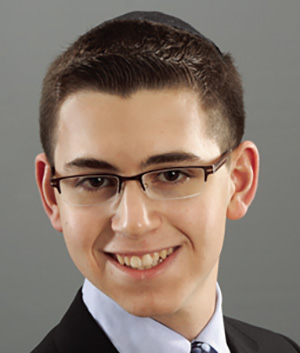

Teaneck/Boston—Growing up with popular local obstetricians as his father and sister, Josh Meier, 20, was born with science in his blood. From early on in his academic career, science and technology fascinated him, and he threw himself into it, winning awards, gaining recognition, earning grants and making a name for himself independent of his family’s successes.
Meier, who hails from the Congregation Bnai Yeshurun community, attended Yavneh Academy in Paramus, then continued with a homeschooling program, and for high school attended the prestigious Bergen County Academies (The Academy for the Advancement of Science and Technology), a program Meier credits with fostering his passion for research and growth.
Like many innovators, the engaging Harvard student’s latest development grew from personal need. Working as a researcher in Boston, a friend told Meier about Uber—at the time, it was not as widely used—and Meier found this a great option for his commuting. But there were times when Meier wished he could schedule his Uber ahead of time, such as times when he might not have his phone with him, or be able to access it to call for an Uber, but know that he needed a ride. He then built an app that would do just that. “I sent them a request to open my API key for the TaxiLater app, and they approved it,” Meier told the Jewish Link. “There was a lot of back and forth but I fixed whatever they wanted and worked closely with them.”
For those unfamiliar with how Uber works, it is a free app that allows a person to put in a destination, get a price, and summon a car to take them from one place to another. Uber will tell the customer the price, how long it will take for a driver to get there (the local Uber drivers need to respond to the request), and once booked, Uber sends the car, license and a photo of the driver to the phone.
With TaxiLater, the user can schedule in advance when they need the car, but it does not go to the Uber drivers at that point. It stays “in the cloud” on Meier’s server until the scheduled time for the request. The benefit to this is obvious. For instance, should someone need a ride, say, from an event where it would be rude to use your phone to call a car, if the time was pre-set, the car can still be waiting at an appointed time. Or if someone has an early morning ride to the airport, no one has to remember to also call an Uber car while packing up. The downside is that, like the Uber app, there is always the possibility that none of the drivers will be available at the time needed, but the customer will not know this until the message is released from the server to the potential drivers. As Meier succinctly explained, “TaxiLater is the ‘Before’ of Uber. Once the message is dispatched, everything then goes through Uber.”
Currently only available for Apple, with Android versions in the works, Meier runs this program wholeheartedly, reading reviews almost daily, and making suggested corrections when applicable. “People tweet, or review online and when I make those changes, people get very excited to see their comments added to the app,” Meier said. Ever the researcher, Meier constantly strives to improve the app by understanding how Uber users use TaxiLater, not just by reading the data (“I didn’t even know you could Uber a motorcycle in Bangkok,” Meier exclaimed), but by talking to Uber drivers and users for their suggestions as well. Some users have put in a request for reminders about the Uber reservation, but others choose to use TaxiLater specifically to avoid thinking about the ride until the scheduled time, so Meier is still considering whether a reminder option would be worthwhile.
Meier worked with Uber to ensure the two platforms work seamlessly. All personal information is anonymized. No credit card information is available to him, which should allow TaxiLater users to schedule with peace of mind.
Meier warns users: There is a “no-show” penalty if the passenger fails to show up. But cancellations are allowed up until the message goes out to the driver from Meier’s server. Usually this means that one has until about five minutes before the scheduled time to cancel.
Earlier this month, Uber itself started testing the option to schedule rides up to 30 days in advance for business users in Seattle. How this will impact Uber use overall, should it extend to the general client base, will be something to see in the future. Uber’s main competitor, Lyft, has also allowed its riders to schedule pickups rather than call at the time needed.
Even with comments and feedback suggesting or even criticizing the app (rarely), overall TaxiLater has been praised by users in reviews on the App Store. Additionally, it has been written up and reviewed by Business Insider and Mashable, as well as various tech blogs.
Though much of Meier’s work has been in the field of stem cell research, molecular science, genes and DNA, he also has an interest in computers and artificial intelligence. Meier merges these areas as a way to “build biological tools that anyone can use, and make chemistry and computer systems as accessible as possible, especially to biologists,” as Meier described. Even during his research last summer at the University of California, San Francisco, a trailblazer in stem cell research, Meier worked in the stem cell research environment while simultaneously working with Square (the people who make it possible for smartphones to accept credit card payments) on their cloud services. This captures Meier’s efforts and interests—the biological research with the technological skill, and bringing them together for people to use in daily life. Which is also what TaxiLater has already done for the Uber community all over the world.
By Jenny Gans










